Here are my favorite poems about horses categorized:
- Classic wild horse poems
- Poems about horses by famous poets
- Beautiful short horse poems
- Funny poems about horses & rhymes
So if you want the best poems about horses, then you’re in the right place.
Enjoy the ride!
- 21 Elating Poems About Swallows
- 35 Gleeful Poems About Rabbits
- 39 Untamed Poems About Lions
- 37 Unflinching Poems About Wolves
- 21 Heart-Fluttering Poems About Butterflies
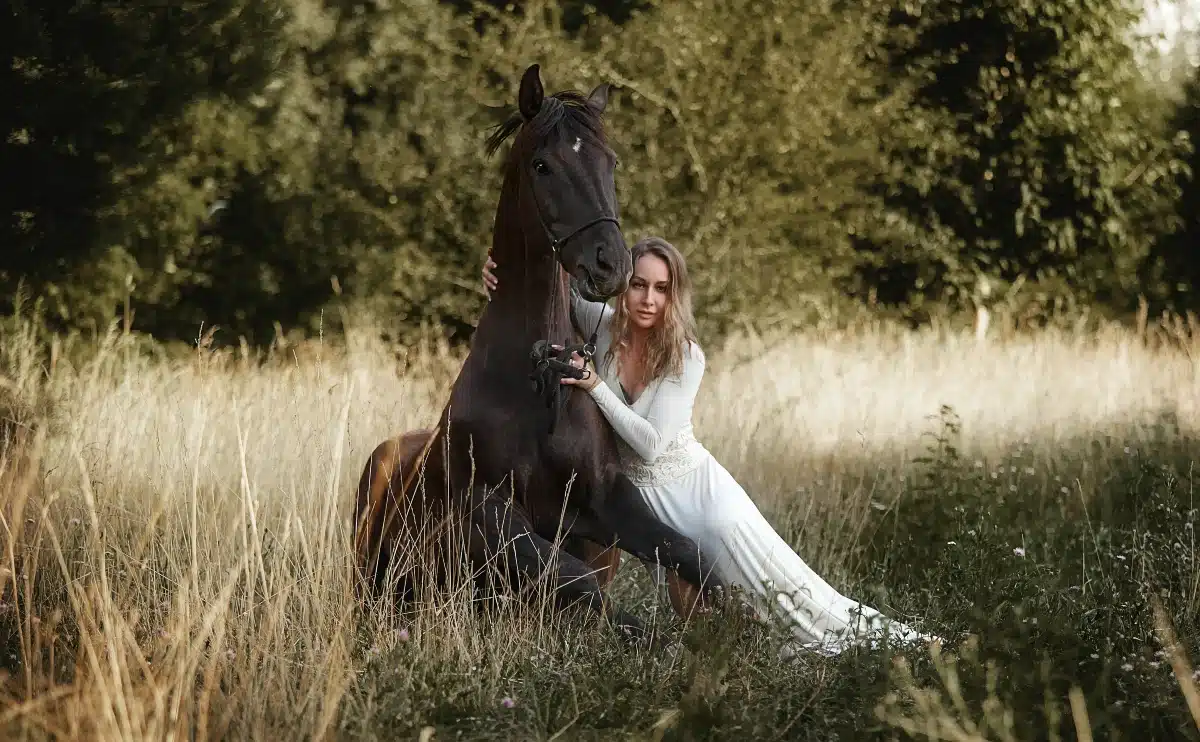
Free-spirited Poems About Horses
Explore the majesty and beauty of horses through the best horse poems, all conveniently located in one place.
From classic works that capture the spirit of the wild horse to humorous poems and rhymes that celebrate the joy and companionship of our equine friends, you’ll find them all here.
Whether you’re a lifelong horse lover or simply appreciate the grace and power of these magnificent creatures, the best poems about horses are sure to leave you inspired and moved.
Keep scrolling down!
My #1 Favorite Poem About Horses
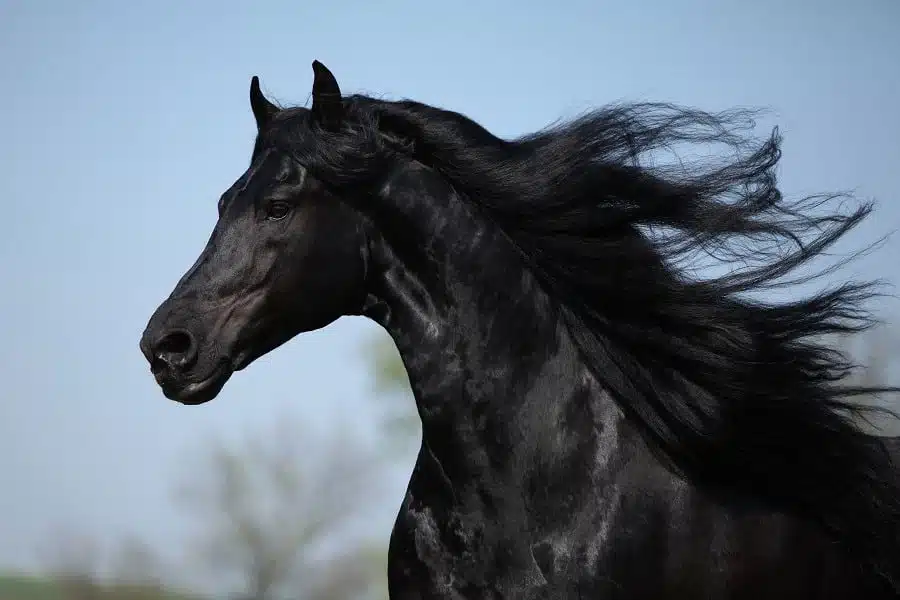
“The Stallion” by Walt Whitman
A gigantic beauty of a stallion, fresh and responsive to my caresses,
Head high in the forehead, wide between the ears,
Limbs glossy and supple, tail dusting the ground,
Eyes full of sparkling wickedness, ears finely cut, flexibly moving.
His nostrils dilate as my heels embrace him,
His well-built limbs tremble with pleasure as we race around and return.
I but use you a minute, then I resign you, stallion,
Why do I need your paces when I myself out-gallop them?
Even as I stand or sit passing faster than you.
Classic Wild Horse Poems
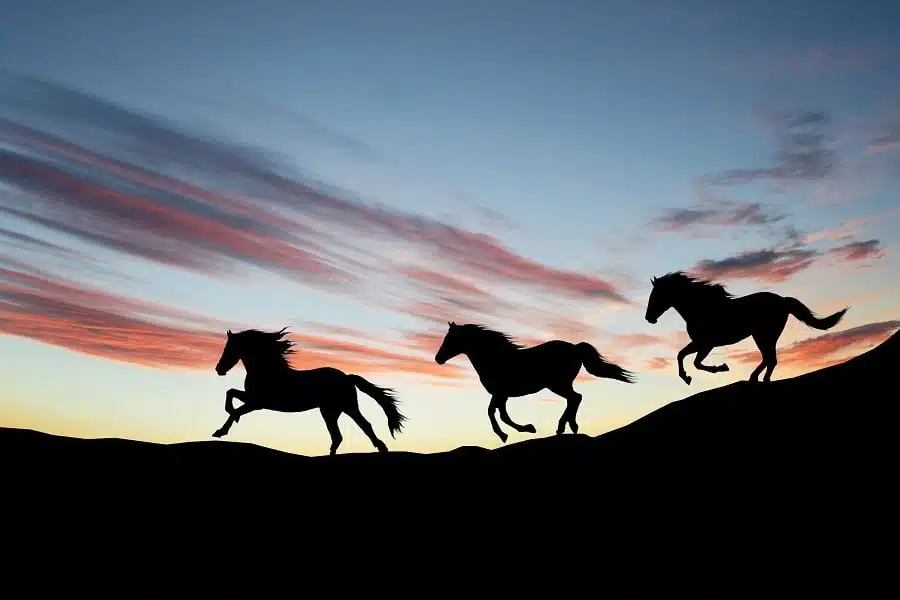
“The Wild Ride” by Louise Imogen Guiney
I hear in my heart, I hear in its ominous pulses
All day, on the road, the hoofs of invisible horses,
All night, from their stalls, the importunate pawing and neighing.
Let cowards and laggards fall back! but alert to the saddle
Weather-worn and abreast, go men of our galloping legion,
With a stirrup-cup each to the lily of women that loves him.
The trail is through dolour and dread, over crags and morasses;
There are shapes by the way, there are things that appal or entice us:
What odds? We are Knights of the Grail, we are vowed to the riding.
Thought’s self is a vanishing wing, and joy is a cobweb,
And friendship a flower in the dust, and glory a sunbeam:
Not here is our prize, nor, alas! after these our pursuing.
A dipping of plumes, a tear, a shake of the bridle,
A passing salute to this world and her pitiful beauty:
We hurry with never a word in the track of our fathers.
(I hear in my heart, I hear in its ominous pulses
All day, on the road, the hoofs of invisible horses,
All night, from their stalls, the importunate pawing and neighing.)
We spur to a land of no name, out-racing the storm-wind;
We leap to the infinite dark like sparks from the anvil.
Thou leadest, O God! All’s well with Thy troopers that follow.
“The Horses” by Katherine Lee Bates
What was our share in the sinning,
That we must share the doom?
Sweet was our life’s beginning
In the spicy meadow-bloom,
With children’s hands to pet us
And kindly tones to call.
To-day the red spurs fret us
Against the bayonet wall.
What had we done, our masters,
That you sold us into hell?
Our terrors and disasters
Have filled your pockets well.
You feast on our starvation;
Your laughter is our groan.
Have horses then no nation,
No country of their own?
What are we, we your horses,
So loyal where we serve,
Fashioned of noble forces
All sensitive with nerve?
Torn, agonized, we wallow
On the blood-bemired sod;
And still the shiploads follow.
Have horses then no God?
“The Blood Horse” by Bryan Waller Procter (Barry Cornwall)
Gamarra is a dainty steed,
Strong, black, and of a noble breed,
Full of fire, and full of bone,
With all his line of fathers known;
Fine his nose, his nostrils thin,
But blown abroad by the pride within!
His mane is like a river flowing,
And his eyes like embers glowing
In the darkness of the night,
And his pace as swift as light.
Look,—how round his straining throat
Grace and shifting beauty float;
Sinewy strength is in his reins,
And the red blood gallops through his veins:
Richer, redder, never ran
Through the boasting heart of man.
He can trace his lineage higher
Than the Bourbon dare aspire,—
Douglas, Guzman, or the Guelph,
Or O’Brien’s blood itself!
He, who hath no peer, was born
Here, upon a red March morn.
But his famous fathers dead
Were Arabs all, and Arab-bred,
And the last of that great line
Trod like one of a race divine!
And yet,—he was but friend to one
Who fed him at the set of sun
By some lone fountain fringed with green;
With him, a roving Bedouin,
He lived (none else would he obey
Through all the hot Arabian day),
And died untamed upon the sands
Where Balkh amidst the desert stands.
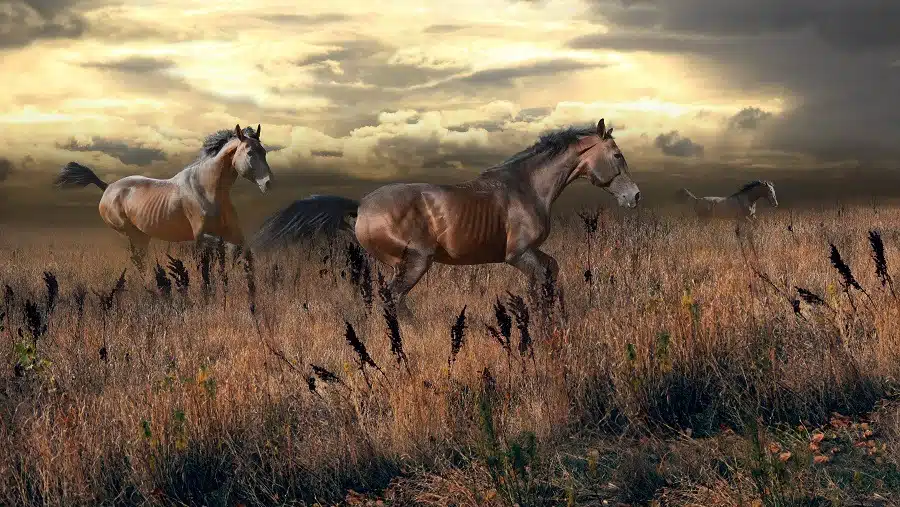
“Rain And Wind” by Madison Julius Cawein
I hear the hoofs of horses
Galloping over the hill,
Galloping on and galloping on,
When all the night is shrill
With wind and rain that beats the pane,
And my soul with awe is still.
For every dripping window
Their headlong rush makes bound,
Galloping up, and galloping by,
Then back again and around,
Till the gusty roofs ring with their hoofs,
And the draughty cellars sound.
And then I hear black horsemen
Hallooing in the night;
Hallooing and hallooing,
They ride o’er vale and height,
And the branches snap and the shutters clap
With the fury of their flight.
Then at each door a horseman,
With burly bearded lip
Hallooing through the keyhole,
Pauses with cloak a-drip;
And the door-knob shakes and the panel quakes
‘Neath the anger of his whip.
All night I hear their gallop,
And their wild halloo’s alarm;
The tree-tops sound and vanes go round
In forest and on farm;
But never a hair of a thing is there,
Only the wind and storm.
“A Canadian Trooper To His Horse” by Helen Leah Reed
Rest here, my horse, the night is dull, – the blood-sick stars are gone,
Listen, for thou like me wert bred in far Saskatchewan.
And this September night at home, under a happier sky,
The bursting yellow sheaves upon the unbounded prairie lie.
Bread, bread – the staff and stay of life – ’tis what the wheatlands yield;
But only death and agony are gathered from this field.
There’s respite now, but ah! good friend, before another day,
Although our bodies may be here, we, we, how far away!
We’ve ridden many a weary mile, together we have fought
For Freedom, honor and the right, and anything we’ve wrought
Our Country to the Empire will still more closely bind.
Ah! where the reddened maple leaf is fluttering in the wind,
There is my heart, oh noble horse, and may we gallop free
Some day again in Canada, our Land of Liberty.
The night drags on toward the dawn, and far on yonder plain
I hear the throb of musketry, I feel its echoing pain.
I see the star-shells breaking, and nearer than their flare,
A wreath of deadly smoke points out that once a town was there.
Look, brother horse, the night is past, and glorious is the dawn,
Away with peril! We’ll ride on for our Saskatchewan.
With day comes hope, and though again the sky with blood is red,
We’ll ride against the enemy, for Victory lies ahead,
Aye! for the Empire – Victory that thou shalt help to bring.
And for the Allies Victory – on earth what greater thing!
“Grierson’s Raid” by Hanford Lennox Gordon
Mount to horse mount to horse;
Forward, Battalion!
Gallop the gallant force;
Down with Rebellion!
Over hill, creek and plain
Clatter the fearless
Dash away splash away
Led by the Peerless.
Carbines crack foemen fly
Hither and thither;
Under the death-fire
They falter and wither.
Burn the bridge tear the track
Down with Rebellion!
Cut the wires cut the wires!
Forward, Battalion!
Day and night night and day,
Gallop the fearless
Swimming the rivers’ floods
Led by the Peerless;
Depots and powder-trains
Blazing and thundering
Masters and dusky slaves
Gazing and wondering.
Eight hundred miles they ride
Dauntless Battalion
Down through the Southern Land
Mad with Rebellion.
Into our lines they dash
Brave Cavaliers
Greeting our flag with
A thunder of cheers.
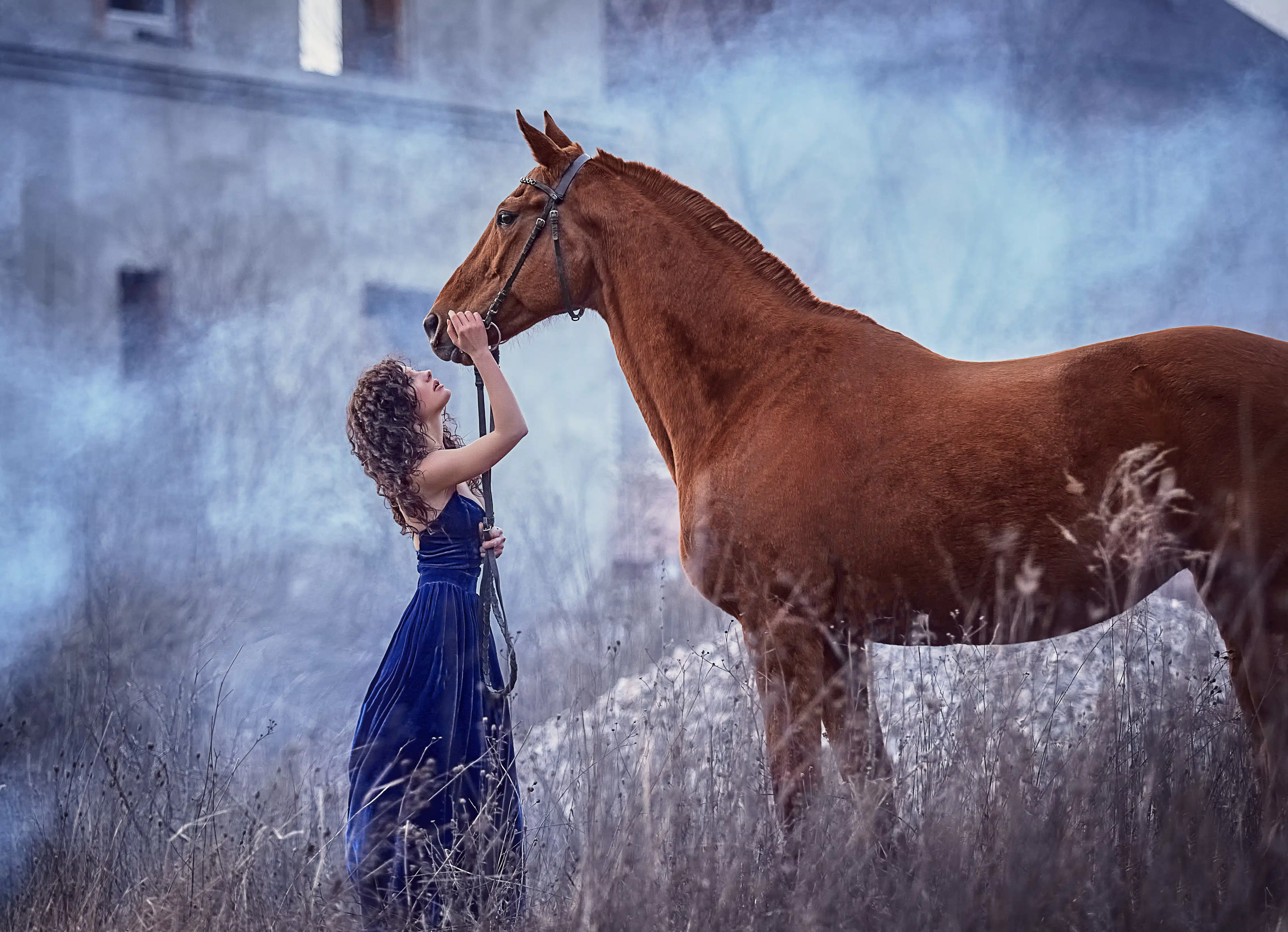
“The Listeners” by Walter de la Mare
“Is there anybody there?” said the Traveller,
Knocking on the moonlit door;
And his horse in the silence champed the grass
Of the forest’s ferny floor;
And a bird flew up out of the turret,
Above the Traveller’s head:
And he smote upon the door again a second time;
“Is there anybody there?” he said.
But no one descended to the Traveller;
No head from the leaf-fringed sill
Leaned over and looked into his grey eyes,
Where he stood perplexed and still.
But only a host of phantom listeners
That dwelt in the lone house then
Stood listening in the quiet of the moonlight
To that voice from the world of men:
Stood thronging the faint moonbeams on the dark stair,
That goes down to the empty hall,
Hearkening in an air stirred and shaken
By the lonely Traveller’s call.
And he felt in his heart their strangeness,
Their stillness answering his cry,
While his horse moved, cropping the dark turf,
‘Neath the starred and leafy sky;
For he suddenly smote on the door, even
Louder, and lifted his head:–
“Tell them I came, and no one answered,
That I kept my word,” he said.
Never the least stir made the listeners,
Though every word he spake
Fell echoing through the shadowiness of the still house
From the one man left awake:
Ay, they heard his foot upon the stirrup,
And the sound of iron on stone,
And how the silence surged softly backward,
When the plunging hoofs were gone.
“Stopping By Woods On A Snowy Evening” by Robert Frost
Whose woods these are I think I know.
His house is in the village, though;
He will not see me stopping here
To watch his woods fill up with snow.
My little horse must think it queer
To stop without a farmhouse near
Between the woods and frozen lake
The darkest evening of the year.
He gives his harness bells a shake
To ask if there is some mistake.
The only other sound’s the sweep
Of easy wind and downy flake.
The woods are lovely, dark and deep,
But I have promises to keep,
And miles to go before I sleep,
And miles to go before I sleep.
“He Bids His Beloved Be At Peace” by William Butler Yeats
I hear the Shadowy Horses, their long manes a-shake,
Their hoofs heavy with tumult, their eyes glimmering
white;
The North unfolds above them clinging, creeping
night,
The East her hidden joy before the morning break,
The West weeps in pale dew and sighs passing away,
The South is pouring down roses of crimson fire:
O vanity of Sleep, Hope, Dream, endless Desire,
The Horses of Disaster plunge in the heavy clay:
Beloved, let your eyes half close, and your heart beat
Over my heart, and your hair fall over my breast,
Drowning love’s lonely hour in deep twilight of rest,
And hiding their tossing manes and their tumultuous
feet.
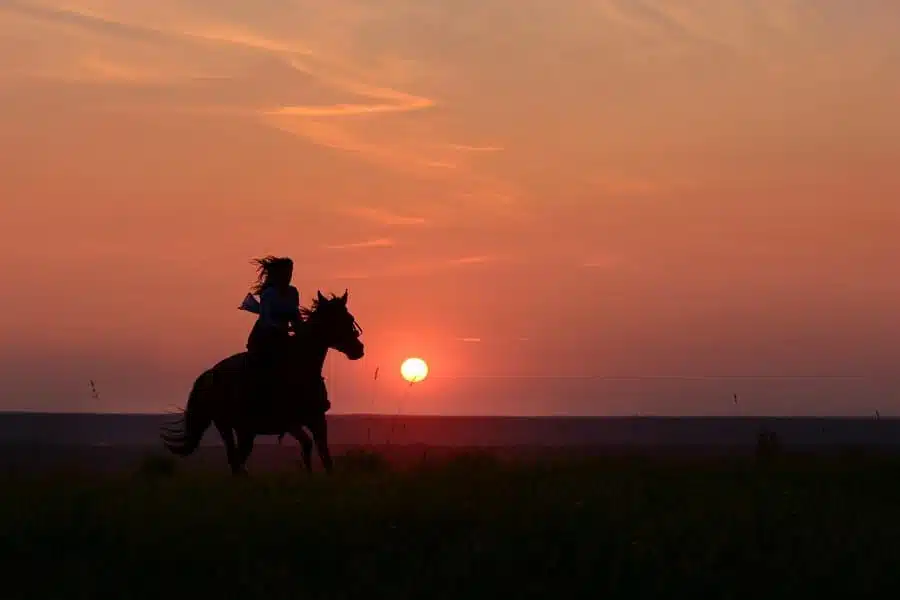
“The Undertaker’s Horse” by Rudyard Kipling
The eldest son bestrides him,
And the pretty daughter rides him,
And I meet him oft o’ mornings on the Course;
And there kindles in my bosom
An emotion chill and gruesome
As I canter past the Undertaker’s Horse.
Neither shies he nor is restive,
But a hideously suggestive
Trot, professional and placid, he affects;
And the cadence of his hoof-beats
To my mind this grim reproof beats:,
“Mend your pace, my friend, I’m coming. Who’s the next?”
Ah! stud-bred of ill-omen,
I have watched the strongest go, men
Of pith and might and muscle, at your heels,
Down the plantain-bordered highway,
(Heaven send it ne’er be my way!)
In a lacquered box and jetty upon wheels.
Answer, sombre beast and dreary,
Where is Brown, the young, the cheery,
Smith, the pride of all his friends and half the Force?
You were at that last dread dak
We must cover at a walk,
Bring them back to me, O Undertaker’s Horse!
With your mane unhogged and flowing,
And your curious way of going,
And that businesslike black crimping of your tail,
E’en with Beauty on your back, Sir,
Pacing as a lady’s hack, Sir,
What wonder when I meet you I turn pale?
It may be you wait your time, Beast,
Till I write my last bad rhyme, Beast,
Quit the sunlight, cut the rhyming, drop the glass,
Follow after with the others,
Where some dusky heathen smothers
Us with marigolds in lieu of English grass.
Or, perchance, in years to follow,
I shall watch your plump sides hollow,
See Carnifex (gone lame) become a corse,
See old age at last o’erpower you,
And the Station Pack devour you,
I shall chuckle then, O Undertaker’s Horse!
But to insult, jibe, and quest, I’ve
Still the hideously suggestive
Trot that hammers out the unrelenting text,
And I hear it hard behind me
In what place soe’er I find me:,
“‘Sure to catch you sooner or later. Who’s the next?”
“In Clay” by Madison Julius Cawein
Here went a horse with heavy laboring stride
Along the woodland side;
Deep in the clay his iron hoof-marks show,
Patient and slow,
Where with his human burden yesterday
He passed this way.
Would that this wind that tramples ’round me here,
Among the sad and sere
Of winter-weary forests, were a steed,
Mighty indeed,
And tameless as the tempest of its pace,
Upon whom man might place.
The boundless burden of his mortal cares,
Life’s griefs, despairs,
And ruined dreams that bow the spirit so!
And let him go
Bearing them far from the sad world, ah me!
Leaving it free.
As in that Age of Gold, of which men tell,
When Earth was glad and gods came here to dwell.
“A Woman Driving” by Thomas Hardy
How she held up the horses’ heads,
Firm-lipped, with steady rein,
Down that grim steep the coastguard treads,
Till all was safe again!
With form erect and keen contour
She passed against the sea,
And, dipping into the chine’s obscure,
Was seen no more by me.
To others she appeared anew
At times of dusky light,
But always, so they told, withdrew
From close and curious sight.
Some said her silent wheels would roll
Rutless on softest loam,
And even that her steeds’ footfall
Sank not upon the foam.
Where drives she now? It may be where
No mortal horses are,
But in a chariot of the air
Towards some radiant star.
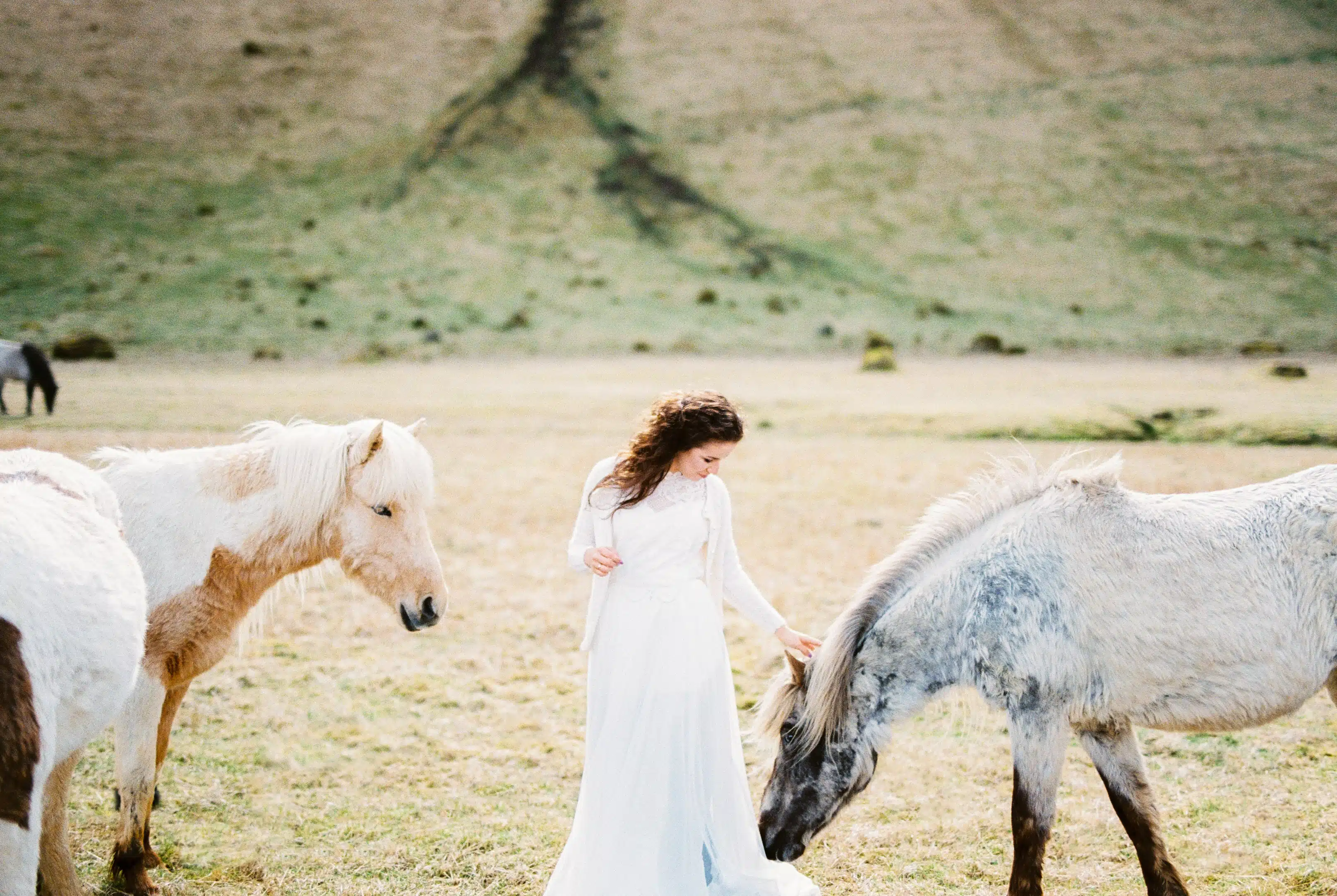
“White Horses” by Rudyard Kipling
Where run your colts at pasture?
Where hide your mares to breed?
‘Mid bergs about the Ice-cap
Or wove Sargasso weed;
By chartless reef and channel,
Or crafty coastwise bars,
But most the ocean-meadows
All purple to the stars!
Who holds the rein upon you?
The latest gale let free.
What meat is in your mangers?
The glut of all the sea.
‘Twixt tide and tide’s returning
Great store of newly dead,
The bones of those that faced us,
And the hearts of those that fled.
Afar, off-shore and single,
Some stallion, rearing swift,
Neighs hungry for new fodder,
And calls us to the drift:
Then down the cloven ridges,
A million hooves unshod,
Break forth the mad White Horses
To seek their meat from God!
Girth-deep in hissing water
Our furious vanguard strains,
Through mist of mighty tramplings
Roll up the fore-blown manes,
A hundred leagues to leeward,
Ere yet the deep is stirred,
The groaning rollers carry
The coming of the herd!
Whose hand may grip your nostrils,
Your forelock who may hold?
E’en they that use the broads with us,
The riders bred and bold,
That spy upon our matings,
That rope us where we run,
They know the strong White Horses
From father unto son.
We breathe about their cradles,
We race their babes ashore,
We snuff against their thresholds,
We nuzzle at their door;
By day with stamping squadrons,
By night in whinnying droves,
Creep up the wise White Horses,
To call them from their loves.
And come they for your calling?
No wit of man may save.
They hear the loosed White Horses
Above their fathers’ grave;
And, kin of those we crippled,
And, sons of those we slew,
Spur down the wild white riders
To school the herds anew.
What service have ye paid them,
Oh jealous steeds and strong?
Save we that throw their weaklings,
Is none dare work them wrong;
While thick around the homestead
Our snow-backed leaders graze,
A guard behind their plunder,
And a veil before their ways.
With march and countermarchings,
With weight of wheeling hosts,
Stray mob or bands embattled,
We ring the chosen coasts:
And, careless of our clamour
That bids the stranger fly,
At peace with our pickets
The wild white riders lie.
. . . .
Trust ye that curdled hollows,
Trust ye the neighing wind,
Trust ye the moaning groundswell,
Our herds are close behind!
To bray your foeman’s armies,
To chill and snap his sword,
Trust ye the wild White Horses,
The Horses of the Lord!
“Colonus’ Praise” by William Butler Yeats
(Chorus.) Come praise Colonus’ horses, and come praise
The wine-dark of the wood’s intricacies,
The nightingale that deafens daylight there,
If daylight ever visit where,
Unvisited by tempest or by sun,
Immortal ladies tread the ground
Dizzy with harmonious sound,
Semele’s lad a gay companion.
And yonder in the gymnasts’ garden thrives
The self-sown, self-begotten shape that gives
Athenian intellect its mastery,
Even the grey-leaved olive-tree
Miracle-bred out of the living stone;
Nor accident of peace nor war
Shall wither that old marvel, for
The great grey-eyed Athene stareS thereon.
Who comes into this countty, and has come
Where golden crocus and narcissus bloom,
Where the Great Mother, mourning for her daughter
And beauty-drunken by the water
Glittering among grey-leaved olive-trees,
Has plucked a flower and sung her loss;
Who finds abounding Cephisus
Has found the loveliest spectacle there is.
because this country has a pious mind
And so remembers that when all mankind
But trod the road, or splashed about the shore,
Poseidon gave it bit and oar,
Every Colonus lad or lass discourses
Of that oar and of that bit;
Summer and winter, day and night,
Of horses and horses of the sea, white horses.
“Bolting” by Mary Tourtel
See this runaway flecked with foam
Galloping fast as he can for home,
Caring nought for the shouting man
Running also as fast as he can.
Flung by the bolter on the roadside
Small is his chance of a pleasant ride.
Two legs matched in a race with four—
Perhaps they’ll meet at the stable door.
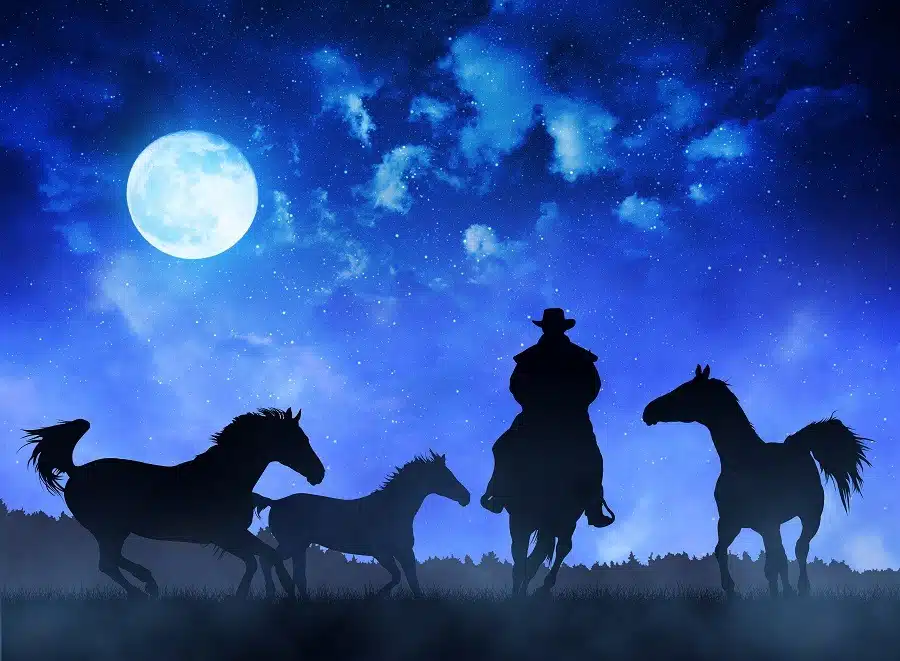
“A Smuggler’s Song” by Rudyard Kipling
If you wake at midnight, and hear a horse’s feet,
Don’t go drawing back the blind, or looking in the street.
Them that ask no questions isn’t told a lie.
Watch the wall, my darling, while the Gentlemen go by!
Five and twenty ponies,
Trotting through the dark,
Brandy for the Parson,
‘Baccy for the Clerk;
Laces for a lady, letters for a spy,
And watch the wall, my darling, while the Gentlemen go by!
Running round the woodlump if you chance to find
Little barrels, roped and tarred, all full of brandy-wine,
Don’t you shout to come and look, nor use ’em for your play.
Put the brishwood back again, and they’ll be gone next day!
If you see the stable-door setting open wide;
If you see a tired horse lying down inside;
If your mother mends a coat cut about and tore;
If the lining’s wet and warm, don’t you ask no more!
If you meet King George’s men, dressed in blue and red,
You be carefull what you say, and mindful what is said.
If they call you “pretty maid,” and chuck you ‘neath the chin,
Don’t you tell where no one is, nor yet where no one’s been!
Knocks and footsteps round the house, whistles after dark,
You’ve no call for running out till the house-dogs bark.
Trusty’s here, and Pincher’s here, and see how dumb they lie,
They don’t fret to follow when the Gentlemen go by!
If you do as you’ve been told, ‘likely there’s a chance,
You’ll be given a dainty doll, all the way from France,
With a cap of Valenciennes, and a velvet hood,
A present from the Gentlemen, along o’ being good!
Five and twenty ponies,
Trotting through the dark,
Brandy for the Parson,
‘Baccy for the Clerk;
Them that asks no questions isn’t told a lie,
Watch the wall, my darling, while the Gentlemen bo by!
Poems About Horses By Famous Poets
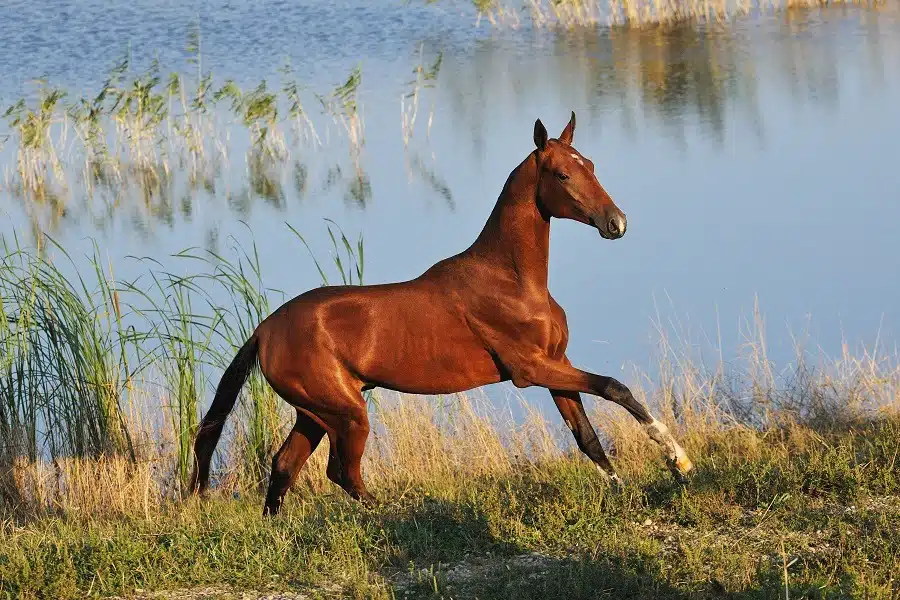
“The Bay Horse” by Arthur Conan Doyle
Squire wants the bay horse,
For it is the best.
Squire holds the mortgage;
Where’s the interest?
Haven’t got the interest,
Can’t raise a sou;
Shan’t sell the bay horse,
Whatever he may do.
Did you see the bay horse?
Such a one to go!
He took a bit of ridin’,
When I showed him at the Show.
First prize the broad jump,
First prize the high;
Gold medal, Class A,
You’ll see it by-and-by.
I bred the bay horse
On the Withy Farm.
I broke the bay horse,
He broke my arm.
Don’t blame the bay horse,
Blame the brittle bone,
I bred him and I’ve fed him,
And he’s all my very own.
Just watch the bay horse
Chock full of sense!
Ain’t he just beautiful,
Risin’ to a fence!
Just hear the bay horse
Whinin’ in his stall,
Purrin’ like a pussy cat
When he hears me call.
But if Squire’s lawyer
Serves me with his writ,
I’ll take the bay horse
To Marley gravel pit.
Over the quarry edge,
I’ll sit him tight,
If he wants the brown hide,
He’s welcome to the white!
“Plowboy” by Carl Sandburg
After the last red sunset glimmer,
Black on the line of a low hill rise,
Formed into moving shadows, I saw
A plowboy and two horses lined against the gray,
Plowing in the dusk the last furrow.
The turf had a gleam of brown,
And smell of soil was in the air,
And, cool and moist, a haze of April.
I shall remember you long,
Plowboy and horses against the sky in shadow.
I shall remember you and the picture
You made for me,
Turning the turf in the dusk
And haze of an April gloaming.
“Peleg Poague” by Edgar Lee Masters
Horses and men are just alike.
There was my stallion, Billy Lee,
Black as a cat and trim as a deer,
With an eye of fire, keen to start,
And he could hit the fastest speed
Of any racer around Spoon River.
But just as you’d think he couldn’t lose,
With his lead of fifty yards or more,
He’d rear himself and throw the rider,
And fall back over, tangled up,
Completely gone to pieces.
You see he was a perfect fraud:
He couldn’t win, he couldn’t work,
He was too light to haul or plow with,
And no one wanted colts from him.
And when I tried to drive him – well,
He ran away and killed me.
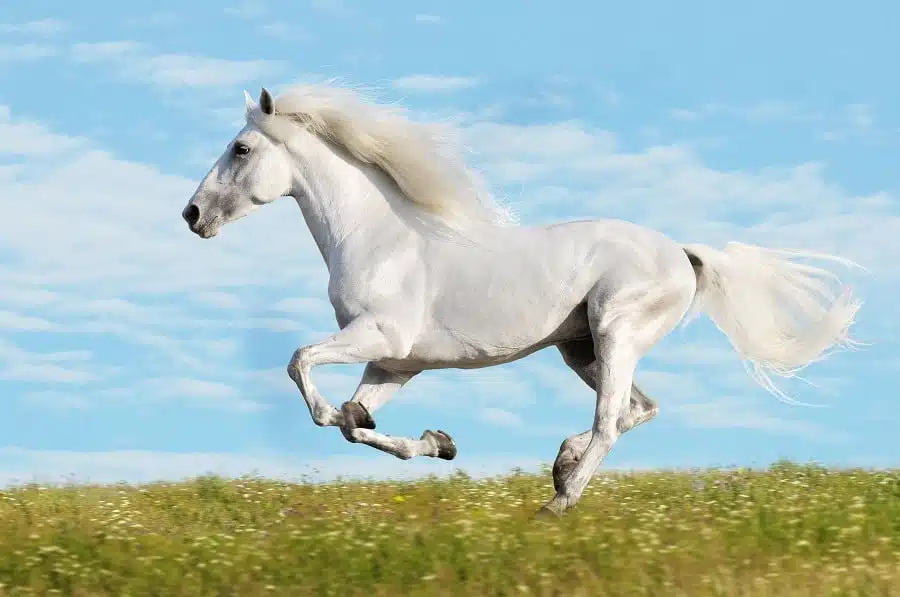
“The Fly-Away Horse” by Eugene Field
Oh, a wonderful horse is the Fly-Away Horse–
Perhaps you have seen him before;
Perhaps, while you slept, his shadow has swept
Through the moonlight that floats on the floor.
For it’s only at night, when the stars twinkle bright,
That the Fly-Away Horse, with a neigh
And a pull at his rein and a toss of his mane,
Is up on his heels and away!
The moon in the sky,
As he gallopeth by,
Cries: “Oh! What a marvelous sight!”
And the Stars in dismay
Hide their faces away
In the lap of old Grandmother Night.
It is yonder, out yonder, the Fly-Away Horse
Speedeth ever and ever away–
Over meadows and lane, over mountains and plains,
Over streamlets that sing at their play;
And over the sea like a ghost sweepeth he,
While the ships they go sailing below,
And he speedeth so fast that the men on the mast
Adjudge him some portent of woe.
“What ho, there!” they cry,
As he flourishes by
With a whisk of his beautiful tail;
And the fish in the sea
Are as scared as can be,
From the nautilus up to the whale!
And the Fly-Away Horse seeks those far-away lands
You little folk dream of at night–
Where candy-trees grow, and honey-brooks flow,
And corn-fields with popcorn are white;
And the beasts in the wood are ever so good
To children who visit them there–
What glory astride of a lion to ride,
Or to wrestle around with a bear!
The monkeys, they say:
“Come on, let us play,”
And they frisk in the coconut-trees:
While the parrots, that cling
To the peanut-vines sing
Or converse with comparative ease!
Off! scamper to bed — you shall ride him to-night!
For, as soon as you’ve fallen asleep,
With a jubilant neigh he shall bear you away
Over forest and hillside and deep!
But tell us, my dear, all you see and you hear
In those beautiful lands over there,
Where the Fly-Away Horse wings his far-away course
With the wee one consigned to his care.
Then grandma will cry
In amazement: “Oh, my!”
And she’ll think it could never be so.
And only we two
Shall know it is true–
You and I, little precious! shall know!
“Strathcona’s Horse” by William Henry Drummond
O I was thine, and thou wert mine, and
ours the boundless plain,
Where the winds of the North, my gallant
steed, ruffled thy tawny mane,
But the summons hath come with roll of drum,
and bugles ringing shrill,
Startling the prairie antelope, the grizzly of the
hill.
‘Tis the voice of Empire calling, and the child-
ren gather fast
From every land where the cross bar floats out
from the quivering mast;
So into the saddle I leap, my own, with bridle
swinging free,
And thy hoofbeats shall answer the trumpets
blowing across the sea.
Then proudly toss thy head aloft, nor think of
the foe to-morrow,
For he who dares to stay our course drinks
deep of the Cup of Sorrow.
Thy form hath pressed the meadow’s breast,
where the sullen grey wolf hides,
The great red river of the North hath cooled
thy burning sides;
Together we’ve slept while the tempest swept
the Rockies’ glittering chain;
And many a day the bronze centaur hath gal-
loped behind in vain.
But the sweet wild grass of mountain pass, and
the battlefields far away,
And the trail that ends where Empire trends,
is the trail we ride to-day.
But proudly toss thy head aloft, nor think of
the foe to-morrow,
For he who bars Strathcona’s Horse, drinks
deep of the Cup of Sorrow.
“Boot And Saddle” by Robert Browning
Boot, saddle, to horse, and away!
Rescue my Castle, before the hot day
Brightens the blue from its silvery grey,
(Chorus) “Boot, saddle, to horse, and away!”
Ride past the suburbs, asleep as you’d say;
Many’s the friend there, will listen and pray
“God’s luck to gallants that strike up the lay,
(Chorus) “Boot, saddle, to horse, and away!”
Forty miles off, like a roebuck at bay,
Flouts Castle Brancepeth the Roundheads array:
Who laughs, Good fellows ere this, by my fay,
(Chorus) “Boot, saddle, to horse, and away!”
Who? My wife Gertrude; that, honest and gay,
Laughs when you talk of surrendering, “Nay!
I’ve better counsellors; what counsel they?”
(Chorus) “Boot, saddle, to horse, and away!”
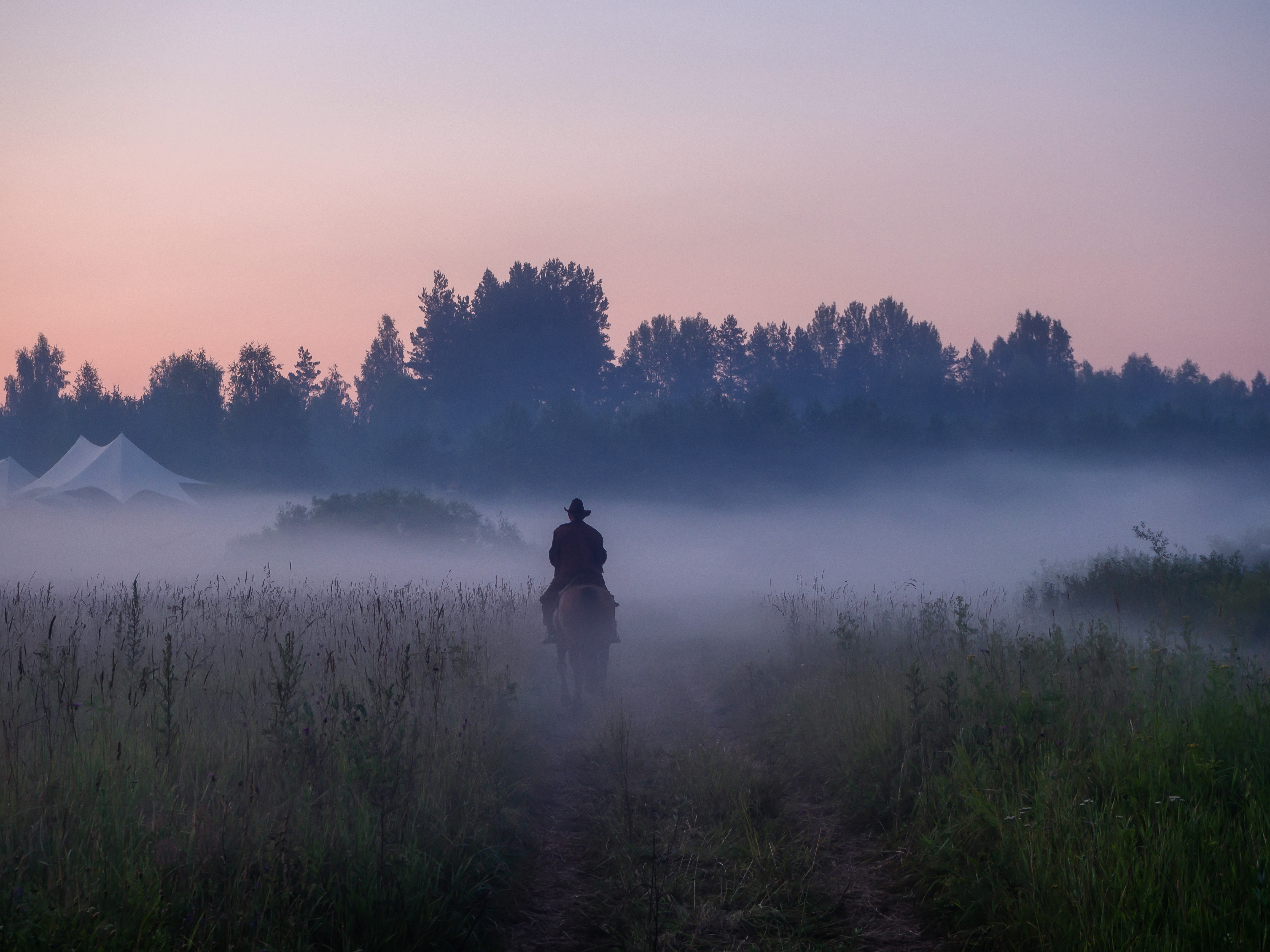
“The Man And His Horse” by Anne Kingsmill Finch
Within a Meadow, on the way,
A sordid Churl resolv’d to stay,
And give his Horse a Bite;
Purloining so his Neighbours Hay,
That at the Inn he might not pay
For Forage all the Night.
With Heart’s content th’ unloaded Steed
Began to neigh, and frisk, and feed;
For nothing more he car’d,
Since none of all his Master’s breed
E’er found such Pasture, at their need,
Or half so well had far’d.
When, in the turning of a Hand,
Out comes the Owner of the Land,
And do’s the Trespass eye;
Which puts poor Bayard to a Stand,
For now his Master do’s command
Him to return and fly.
But Hunger quick’ning up his Wit,
And Grass being sweeter than the Bit,
He to the Clown reply’d;
Shall I for you this Dinner quit,
Who to my Back hard Burdens fit,
And to the Death wou’d ride?
No; shou’d I as a Stray be found,
And seiz’d upon forbidden Ground,
I’ll on this Spot stand still;
For tho’ new Riders shou’d abound,
(Or did Mankind this Field surround)
They cou’d but use me ill.
Urge no Man to despair; lest in the Fit
He with some Counterblow thy Head may hit.
“The Old Whim Horse” by Edward Dyson
He’s an old grey horse, with his head bowed sadly,
And with dim old eyes and a queer roll aft,
With the off-fore sprung and the hind screwed badly
And he bears all over the brands of graft;
And he lifts his head from the grass to wonder
Why by night and day now the whim is still,
Why the silence is, and the stampers’ thunder
Sounds forth no more from the shattered mill.
In that whim he worked when the night winds bellowed
On the riven summit of Giant’s Hand,
And by day when prodigal Spring had yellowed
All the wide, long sweep of enchanted land;
And he knew his shift, and the whistle’s warning,
And he knew the calls of the boys below;
Through the years, unbidden, at night or morning,
He had taken his stand by the old whim bow.
But the whim stands still, and the wheeling swallow
In the silent shaft hangs her home of clay,
And the lizards flirt and the swift snakes follow
O’er the grass-grown brace in the summer day;
And the corn springs high in the cracks and corners
Of the forge, and down where the timber lies;
And the crows are perched like a band of mourners
On the broken hut on the Hermit’s Rise.
All the hands have gone, for the rich reef paid out,
And the company waits till the calls come in;
But the old grey horse, like the claim, is played out,
And no market’s near for his bones and skin.
So they let him live, and they left him grazing
By the creek, and oft in the evening dim
I have seen him stand on the rises, gazing
At the ruined brace and the rotting whim.
The floods rush high in the gully under,
And the lightnings lash at the shrinking trees,
Or the cattle down from the ranges blunder
As the fires drive by on the summer breeze.
Still the feeble horse at the right hour wanders
To the lonely ring, though the whistle’s dumb,
And with hanging head by the bow he ponders
Where the whim boy’s gone-why the shifts don’t come.
But there comes a night when he sees lights glowing
In the roofless huts and the ravaged mill,
When he hears again all the stampers going-
Though the huts are dark and the stampers still:
When he sees the steam to the black roof clinging
As its shadows roll on the silver sands,
And he knows the voice of his driver singing,
And the knocker’s clang where the braceman stands.
See the old horse take, like a creature dreaming,
On the ring once more his accustomed place;
But the moonbeams full on the ruins streaming
Show the scattered timbers and grass-grown brace.
Yet he hears the sled in the smithy falling,
And the empty truck as it rattles back,
And the boy who stands by the anvil, calling;
And he turns and backs, and he ‘takes up slack.’
While the old drum creaks, and the shadows shiver
As the wind sweeps by, and the hut doors close,
And the bats dip down in the shaft or quiver
In the ghostly light, round the grey horse goes;
And he feels the strain on his untouched shoulder,
Hears again the voice that was dear to him,
Sees the form he knew-and his heart grows bolder
As he works his shift by the broken whim.
He hears in the sluices the water rushing
As the buckets drain and the doors fall back:
When the early dawn in the east is blushing,
He is limping still round the old, old track.
Now he pricks his ears, with a neigh replying
To a call unspoken, with eyes aglow,
And he sways and sinks in the circle, dying;
From the ring no more will the grey horse go.
In a gully green, where a dam lies gleaming,
And the bush creeps back on a worked-out claim,
And the sleepy crows in the sun sit dreaming
On the timbers grey and a charred hut frame,
Where the legs slant down, and the hare is squatting
In the high rank grass by the dried-up course,
Nigh a shattered drum and a king-post rotting
Are the bleaching bones of the old grey horse.
“The Iron Horse” by James Whitcomb Riley
No song is mine of Arab steed –
My courser is of nobler blood,
And cleaner limb and fleeter speed,
And greater strength and hardihood
Ehan ever cantered wild and free
Across the plains of Araby.
Go search the level desert-land
From Sana on to Samarcand –
Wherever Persian prince has been
Or Dervish, Sheik or Bedouin,
And I defy you there to point
Me out a steed the half so fine –
From tip of ear to pastern-joint –
As this old iron horse of mine.
You do not know what beauty is –
You do not know what gentleness
His answer is to my caress! –
Why, look upon this gait of his, –
A touch upon his iron rein –
He moves with such a stately grace
The sunlight on his burnished mane
Is barely shaken in its place;
And at touch he changes pace,
And, gliding backward, stops again.
And talk of mettle – Ah! my friend,
Such passion smoulders in his breast
That when awakened it will send
A thrill of rapture wilder than
Ere palpitated heart of man
When flaming at its mightiest.
And there’s a fierceness in his ire –
A maddened majesty that leaps
Along his veins in blood of fire,
Until the path his vision sweeps
Spins out behind him like a thread
Unraveled from the reel of time,
As, wheeling on his course sublime,
The earth revolves beneath his tread.
Then stretch away, my gallant steed!
Thy mission is a noble one:
You bear the father to the son,
And sweet relief to bitter need;
You bear the stranger to his friends;
You bear the pilgrim to the shrine,
And back again the prayer he sends
That God will prosper me and mine, –
The star that on thy forehead gleams
Has blossomed in our brightest dreams.
Then speed thee on thy glorious race!
The mother waits thy ringing pace;
The father leans an anxious ear
The thunder of thy hoofs to hear;
The lover listens, far away,
To catch thy keen exultant neigh;
And, where thy breathings roll and rise,
The husband strains his eager eyes,
And laugh of wife and baby-glee
Ring out to greet and welcome thee.
Then stretch away! and when at last
The master’s hand shall gently check
Thy mighty speed, and hold thee fast,
The world will pat thee on the neck.
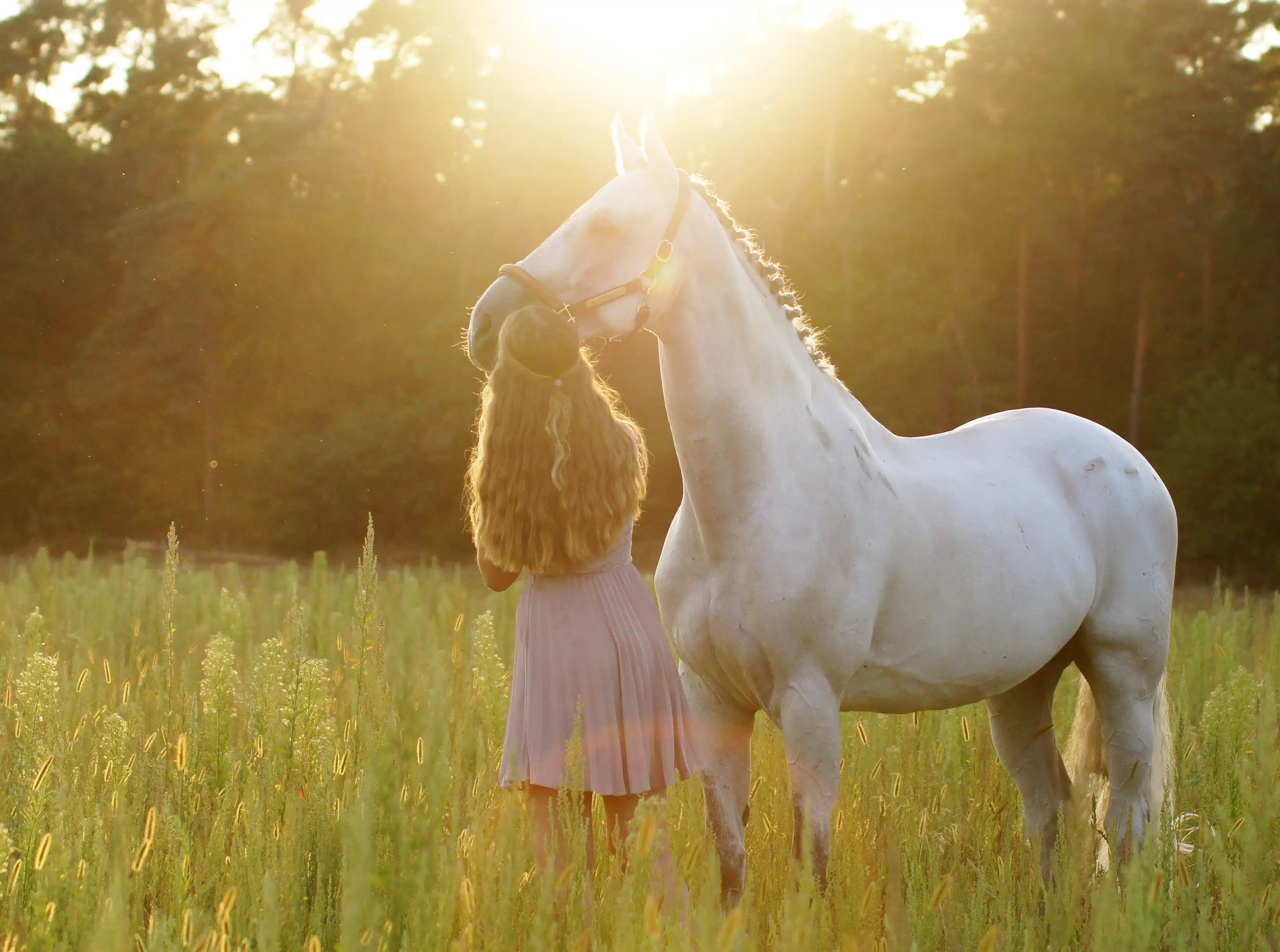
“Reverie” by Walter De La Mare
When slim Sophia mounts her horse
And paces down the avenue,
It seems an inward melody
She paces to.
Each narrow hoof is lifted high
Beneath the dark enclust’ring pines,
A silver ray within his bit
And bridle shines.
His eye burns deep, his tail is arched,
And streams upon the shadowy air,
The daylight sleeks his jetty flanks,
His mistress’ hair.
Her habit flows in darkness down,
Upon the stirrup rests her foot,
Her brow is lifted, as if earth
She heeded not.
‘Tis silent in the avenue,
The sombre pines are mute of song,
The blue is dark, there moves no breeze
The boughs among.
When slim Sophia mounts her horse
And paces down the avenue,
It seems an inward melody
She paces to.
“Winter Evening” by Archibald Lampman
To-night the very horses springing by
Toss gold from whitened nostrils. In a dream
The streets that narrow to the westward gleam
Like rows of golden palaces; and high
From all the crowded chimneys tower and die
A thousand aureoles. Down in the west
The brimming plains beneath the sunset rest,
One burning sea of gold. Soon, soon shall fly
The glorious vision, and the hours shall feel
A mightier master; soon from height to height,
With silence and the sharp unpitying stars,
Stern creeping frosts, and winds that touch like steel,
Out of the depth beyond the eastern bars,
Glittering and still shall come the awful night.
“Suppose” by Walter De La Mare
Suppose … and suppose that a wild little Horse of Magic
Came cantering out of the sky,
With bridle of silver, and into the saddle I mounted,
To fly — and to fly;
And we stretched up into the air, fleeting on in the sunshine,
A speck in the gleam,
On galloping hoofs, his mane in the wind out-flowing,
In a shadowy stream;
And oh, when, all lone, the gentle star of evening
Came crinkling into the blue,
A magical castle we saw in the air, like a cloud of moonlight,
As onward we flew;
And across the green moat on the drawbridge we foamed and we snorted,
And there was a beautiful Queen
Who smiled at me strangely; and spoke to my wild little Horse, too —
A lovely and beautiful Queen;
And she cried with delight — and delight — to her delicate maidens,
‘Behold my daughter — my dear!’
And they crowned me with flowers, and then to their harps sate playing,
Solemn and clear;
And magical cakes and goblets were spread on the table;
And at window the birds came in;
Hopping along with bright eyes, pecking crumbs from the platters,
And sipped of the wine;
And splashing up — up to the roof tossed fountains of crystal;
And Princes in scarlet and green
Shot with their bows and arrows, and kneeled with their dishes
Of fruits for the Queen;
And we walked in a magical garden with rivers and bowers,
And my bed was of ivory and gold;
And the Queen breathed soft in my ear a song of enchantment —
And I never grew old….
And I never, never came back to the earth, oh, never and never;
How mother would cry and cry!
There’d be snow on the fields then, and all these sweet flowers in the winter
Would wither, and die….
Suppose … and suppose .
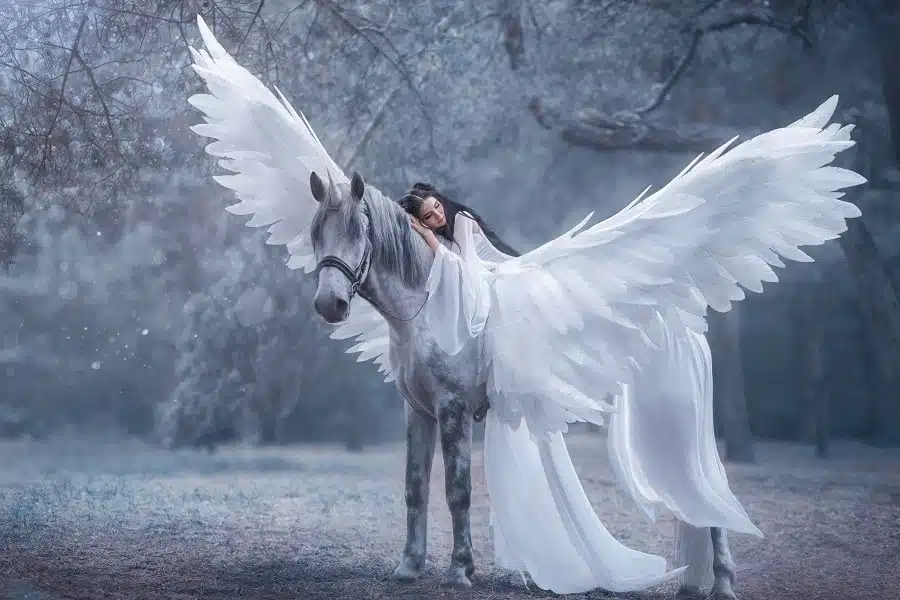
“Cleaning Up” by Edward Dyson’by Edward Dyson
When the horse has been unharnessed and we’ve flushed the old machine,
And the water o’er the sluice is running evenly and clean;
When there’s thirty load before us, and the sun is high and bright,
And we’ve worked from early morning and shall have to work till night,
Not a man of us is weary, though the graft is pretty rough,
If we see the proper colour showing freely through the stuff.
With a dandy head of water and a youngster at the rear
To hand along the billy, boys, and keep the tail race clear,
We lift the wash and flash the fork and make the gravel fly.
The shovelling is heavy and we’re soaked from heel to thigh;
But it makes a fellow tireless and his thews and sinews tough
If the colour’s showing freely as he gaily shifts the stuff.
When Geordie Best is pumping to a rollicking refrain,
And Sandy wipes his streaming brow and shakes the fork again,
The pebbles dance and rattle and the water seems to laugh,
Good luck is half the battle and good will’s the other half;
And no day’s too long and trying and no toil is hard enough
When we see the colour showing in each shovelful of stuff.
Can the mining speculator with a pile of golden scrip,
Or the plunger who has laid his all upon a winning tip,
Or the city man who’s hit upon a profitable deal,
Know the wonderful elation that the lucky diggers feel
When Fortune’s smiled but grimly and the storeman’s looking gruff,
And at last they see the colour showing freely in the stuff?
Never, mates! It is a feeling that no other winner knows,
Not the soldier marching homeward from the conquest of his foes,
Nor the scholar who’s successful in his searching of the skies,
Nor the squalid miser grovelling where his secret treasure lies.
‘Tis a keener, wilder rapture in the digger bold and bluff,
Who feeds the sluice and sees the colour shining in the stuff.
Then lift the wash, and flash the fork, and make the gravel fly!
We can laugh at all the pleasures on which other men rely,
When the water o’er the sluice is running evenly and clean,
And the loaded ripples glitter with a lively golden sheen.
No day’s too long and trying, and no toil is hard enough,
When we wash her down and see the colour freely through the stuff.
“O’Dowd Of The Jefferson Club” by Edwin C. Ranck
A maddened horse comes down the street,
With waving mane and flying feet.
The crowd scatters in every direction;
It looks like a fight at a city election.
A big policeman waves his hands,
And the air is full of vague commands,
While across the street a retail grocer
Shrieks to his child as the horse draws closer
When suddenly out of the mad hubbub,
Steps Jimmie O’Dowd of the Jefferson Club.
Every man there holds his breath–
To stop the horse means sudden death.
But quick as a flash,
O’Dowd makes a dash.
With all his might and the horse’s mane,
He brings the old plug to a halt again.
Then every man there doffs his hat
And cries “Well, what do you think of that?”
Never since the days of Nero
Has there been a greater hero.
“Pegasus In Harness” by Friedrich Schiller
Once to a horse-fair, it may perhaps have been
Where other things are bought and sold, I mean
At the Haymarket, there the muses’ horse
A hungry poet brought to sell, of course.
‘The hippogriff neighed shrilly, loudly,
And reared upon his hind-legs proudly;
In utter wonderment each stood and cried:
“The noble regal beast!” But, woe betide!
Two hideous wings his slender form deface,
The finest team he else would not disgrace.
“The breed,” said they, “is doubtless rare,
But who would travel through the air?”
Not one of them would risk his gold.
At length a farmer grew more bold:
“As for his wings, I of no use should find them,
But then how easy ’tis to clip or bind them!
The horse for drawing may be useful found,
So, friend, I don’t mind giving twenty pound!”
The other glad to sell his merchandise,
Cried, “Done!” and Hans rode off upon his prize.
The noble creature was, ere long, put-to,
But scarcely felt the unaccustomed load,
Than, panting to soar upwards, off he flew,
And, filled with honest anger, overthrew
The cart where an abyss just met the road.
“Ho! ho!” thought Hans: “No cart to this mad beast
I’ll trust. Experience makes one wise at least.
To drive the coach to-morrow now my course is,
And he as leader in the team shall go.
The lively fellow’ll save me full two horses;
As years pass on, he’ll doubtless tamer grow.”
All went on well at first. The nimble steed
His partners roused, like lightning was their speed.
What happened next? Toward heaven was turned his eye,
Unused across the solid ground to fly,
He quitted soon the safe and beaten course,
And true to nature’s strong resistless force,
Ran over bog and moor, o’er hedge and pasture tilled;
An equal madness soon the other horses filled
No reins could hold them in, no help was near,
Till, only picture the poor travellers’ fear!
The coach, well shaken, and completely wrecked,
Upon a hill’s steep top at length was checked.
“If this is always sure to be the case,”
Hans cried, and cut a very sorry face,
“He’ll never do to draw a coach or wagon;
Let’s see if we can’t tame the fiery dragon
By means of heavy work and little food.”
And so the plan was tried. But what ensued?
The handsome beast, before three days had passed,
Wasted to nothing. “Stay! I see at last!”
Cried Hans. “Be quick, you fellows! yoke him now
With my most sturdy ox before the plough.”
No sooner said than done. In union queer
Together yoked were soon winged horse and steer.
The griffin pranced with rage, and his remaining might
Exerted to resume his old-accustomed flight.
‘Twas all in vain his partner stepped with circumspection,
And Phoebus’ haughty steed must follow his direction;
Until at last, by long resistance spent,
When strength his limbs no longer was controlling,
The noble creature, with affliction bent,
Fell to the ground, and in the dust lay rolling.
“Accursed beast!” at length with fury mad
Hans shouted, while he soundly plied the lash,
“Even for ploughing, then, thou art too bad!
That fellow was a rogue to sell such trash!”
Ere yet his heavy blows had ceased to fly,
A brisk and merry youth by chance came by.
A lute was tinkling in his hand,
And through his light and flowing hair
Was twined with grace a golden band.
“Whither, my friend, with that strange pair?”
From far he to the peasant cried.
“A bird and ox to one rope tied
Was such a team e’er heard of, pray?
Thy horse’s worth I’d fain essay;
Just for one moment lend him me,
Observe, and thou shalt wonders see!”
The hippogriff was loosened from the plough,
Upon his back the smiling youth leaped now;
No sooner did the creature understand
That he was guided by a master-hand,
Than ‘ginst his bit he champed, and upward soared
While lightning from his flaming eyes outpoured.
No longer the same being, royally
A spirit, ay, a god, ascended he,
Spread in a moment to the stormy wind
His noble wings, and left the earth behind,
And, ere the eye could follow him,
Had vanished in the heavens dim.
Beautiful Short Horse Poems
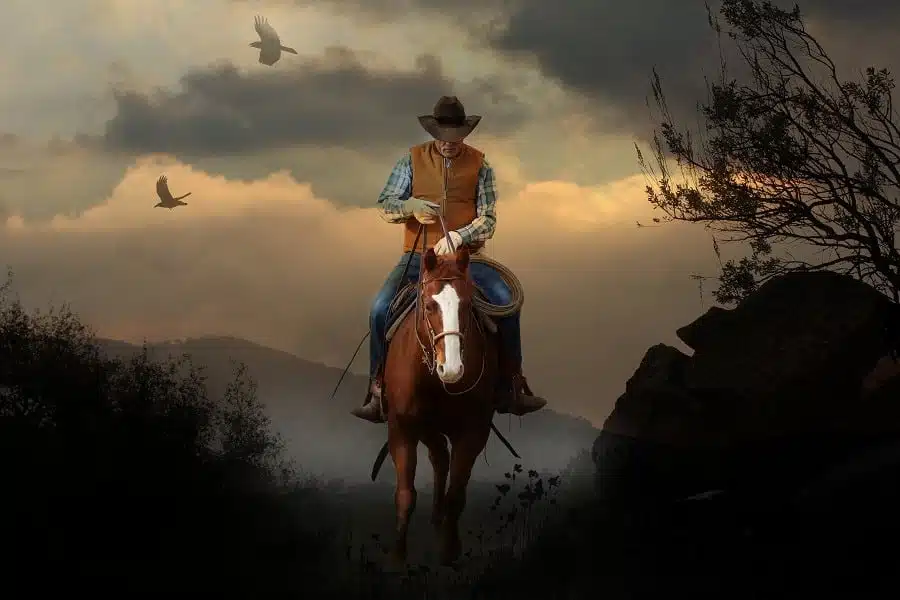
“Horse And Man” by Walter Crane
When the Horse first took Man on his back,
To help him the Stag to attack;
How little his dread,
As the enemy fled,
Man would make him his slave & his hack.
“The Horseman” by Walter De La Mare
I heard a horseman
Ride over the hill;
The moon shone clear,
The night was still;
His helm was silver,
And pale was he;
And the horse he rode
Was of ivory.
“The Horse And The Ass” by Walter Crane
Overladen the Ass was. The Horse
Wouldn’t help; but had time for remorse
When the Ass lay dead there;
For he then had to bear
Both the load of the Ass & his corse.
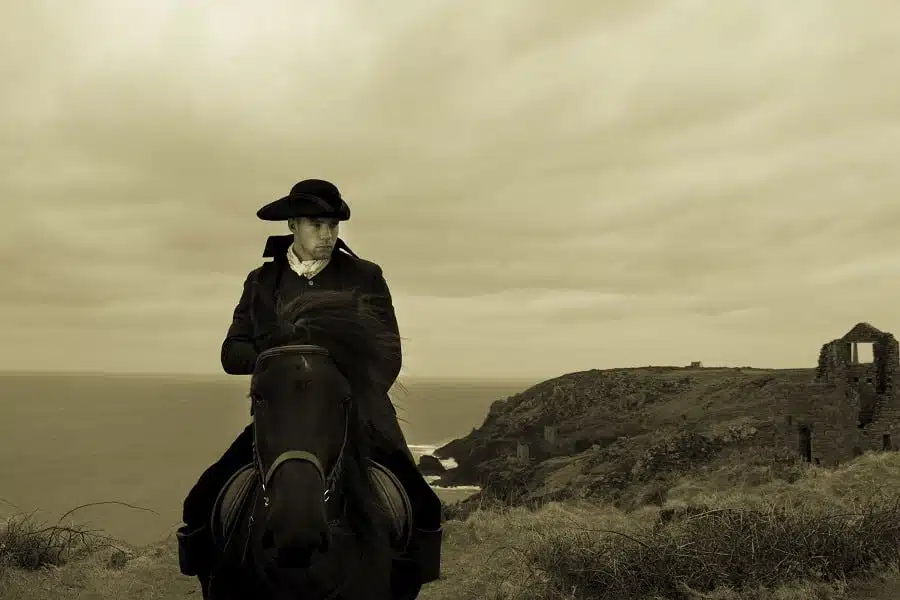
“A Time To Talk” by Robert Frost
When a friend calls to me from the road
And slows his horse to a meaning walk,
I don’t stand still and look around
On all the hills I haven’t hoed,
And shout from where I am, What is it?
No, not as there is a time to talk.
I thrust my hoe in the mellow ground,
Blade-end up and five feet tall,
And plod: I go up to the stone wall
For a friendly visit.
“Horses” by Witter Bynner
Words are hoops
Through which to leap upon meanings,
Which are horses’ backs,
Bare, moving.
“The Horse Wishing to Be Revenged Upon the Stag” by Jean de La Fontaine
The horses have not always been
The humble slaves of men.
When, in the far-off past,
The fare of gentlemen was mast,
And even hats were never felt,
Horse, ass, and mule in forests dwelt.
Nor saw one then, as in these ages,
So many saddles, housings, pillions;
Such splendid equipages,
With golden-lace postilions;
Such harnesses for cattle,
To be consumed in battle;
As one saw not so many feasts,
And people married by the priests.
The horse fell out, within that space,
With the antler’d stag, so fleetly made:
He could not catch him in a race,
And so he came to man for aid.
Man first his suppliant bitted;
Then, on his back well seated,
Gave chase with spear, and rested not
Till to the ground the foe he brought.
This done, the honest horse, quite blindly,
Thus thank’d his benefactor kindly:–
‘Dear sir, I’m much obliged to you;
I’ll back to savage life. Adieu!’
‘O, no,’ the man replied;
‘You’d better here abide;
I know too well your use.
Here, free from all abuse,
Remain a liege to me,
And large your provender shall be.’
Alas! good housing or good cheer,
That costs one’s liberty, is dear.
The horse his folly now perceived,
But quite too late he grieved.
No grief his fate could alter;
His stall was built, and there he lived,
And died there in his halter.
Ah! wise had he one small offence forgot!
Revenge, however sweet, is dearly bought
By that one good, which gone, all else is nought.
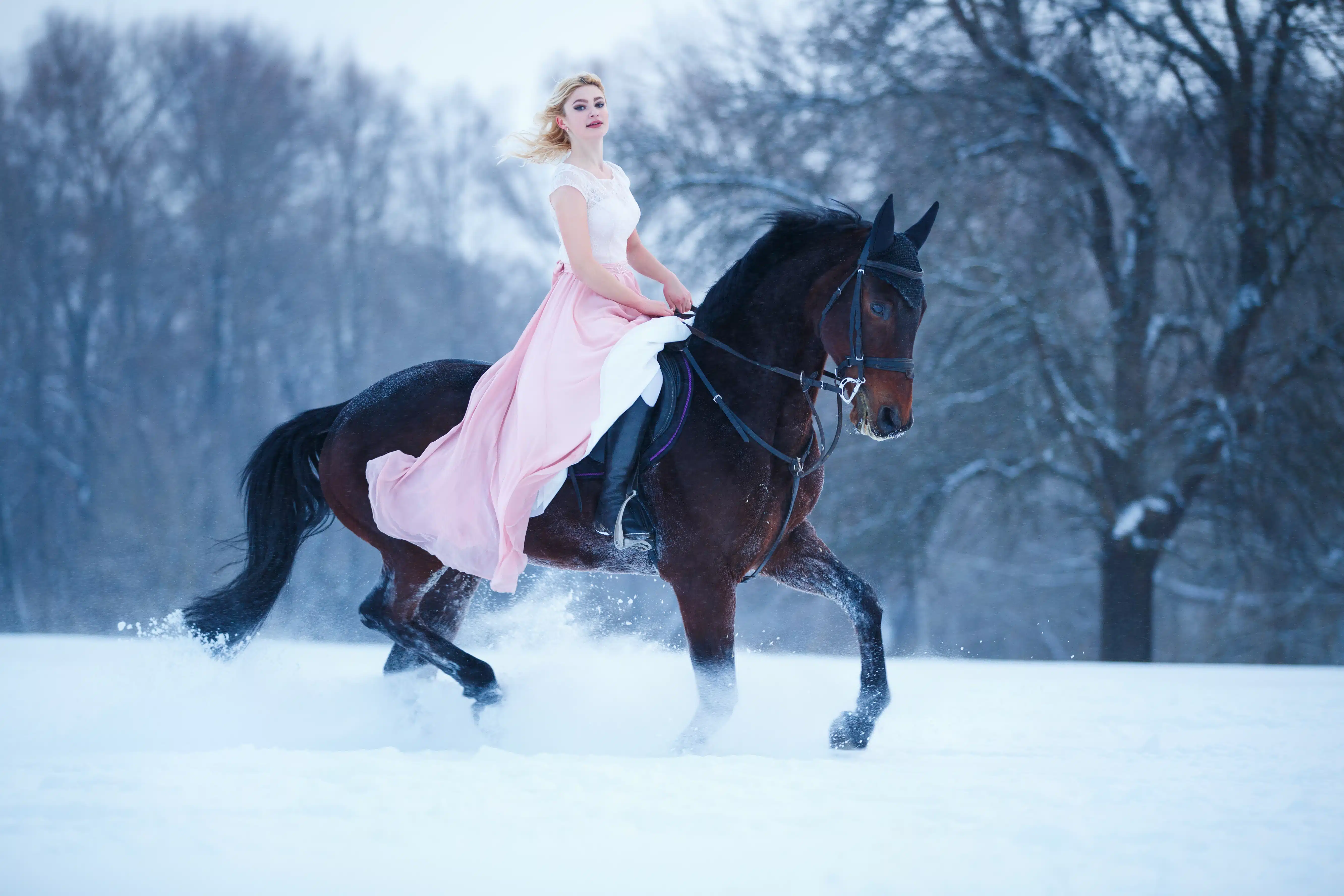
“A Winter Ride” by Amy Lowell
Who shall declare the joy of the running!
Who shall tell of the pleasures of flight!
Springing and spurning the tufts of wild heather,
Sweeping, wide-winged, through the blue dome of light.
Everything mortal has moments immortal,
Swift and God-gifted, immeasurably bright.
So with the stretch of the white road before me,
Shining snowcrystals rainbowed by the sun,
Fields that are white, stained with long, cool, blue shadows,
Strong with the strength of my horse as we run.
Joy in the touch of the wind and the sunlight!
Joy! With the vigorous earth I am one.
“Galway Races” by W. B. Yeats
There where the racecourse is
Delight makes all of the one mind
The riders upon the swift horses
The field that closes in behind.
We too had good attendance once,
Hearers, hearteners of the work,
Aye, horsemen for companions
Before the merchant and the clerk
Breathed on the world with timid breath;
But some day and at some new moon
We’ll learn that sleeping is not death
Hearing the whole earth change its tune,
Flesh being wild again, and it again
Crying aloud as the racecourse is;
And find hearteners among men
That ride upon horses.
“The Old Horse In The City” by Vachel Lindsay
The moon’s a peck of corn. It lies
Heaped up for me to eat.
I wish that I might climb the path
And taste that supper sweet.
Men feed me straw and scanty grain
And beat me till I’m sore.
Some day I’ll break the halter-rope
And smash the stable-door,
Run down the street and mount the hill
Just as the corn appears.
I’ve seen it rise at certain times
For years and years and years.
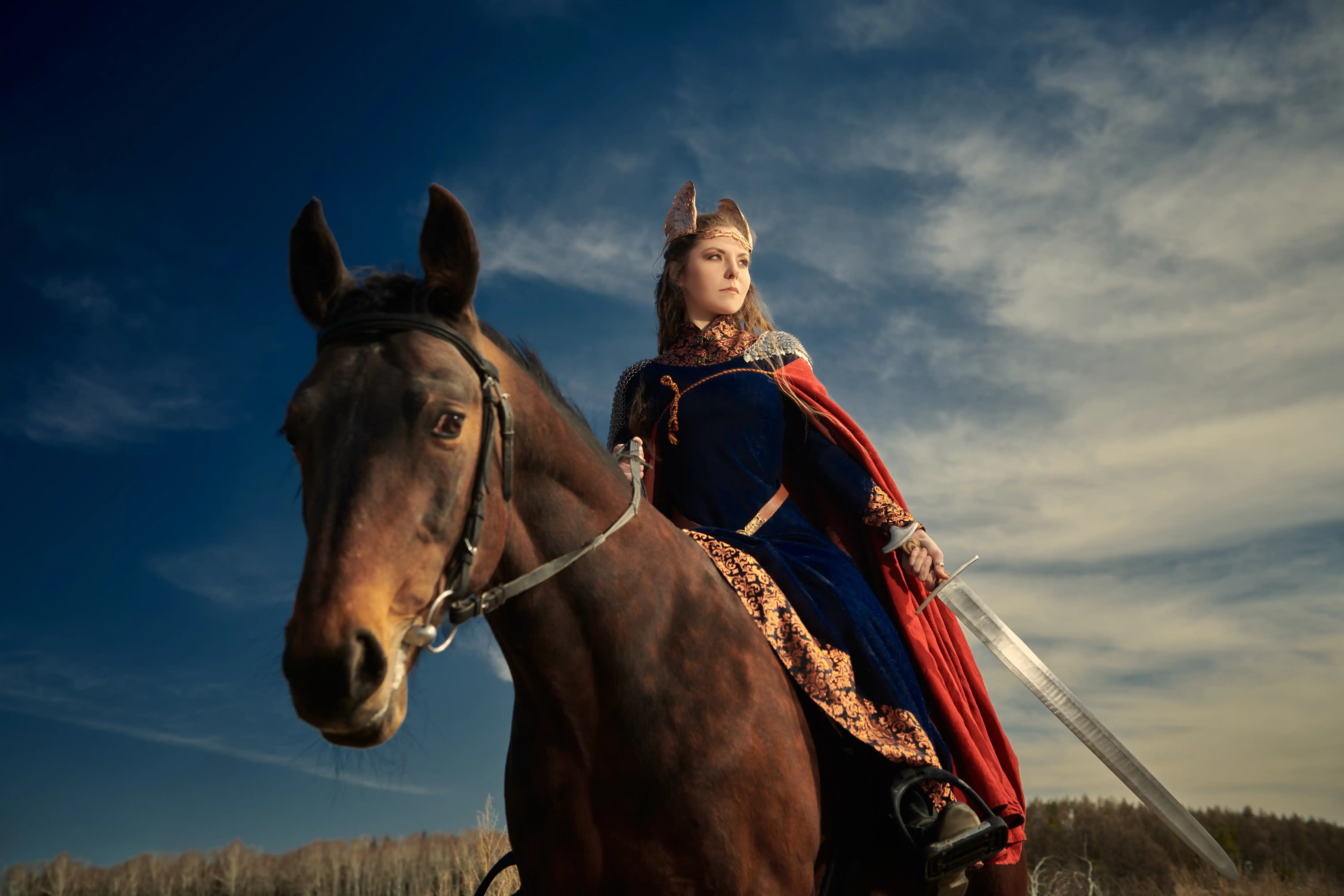
“Having This Day My Horse” by Sir Philip Sidney
Having this day my horse, my hand, my lance
Guided so well that I obtain’d the prize,
Both by the judgment of the English eyes
And of some sent from that sweet enemy France;
Horsemen my skill in horsemanship advance,
Town folks my strength; a daintier judge applies
His praise to sleight which from good use doth rise;
Some lucky wits impute it but to chance;
Others, because of both sides I do take
My blood from them who did excel in this,
Think Nature me a man of arms did make.
How far they shot awry! The true cause is,
Stella look’d on, and from her heav’nly face
Sent forth the beams which made so fair my race.
“Cavalry Horses” by Rudyard Kipling
By the brand on my withers, the finest of tunes
Is played by the Lancers, Hussars, and Dragoons,
And it’s sweeter than “Stables” or “Water” to me,
The Cavalry Canter of “Bonnie Dundee!”
Then feed us and break us and handle and groom,
And give us good riders and plenty of room,
And launch us in column of squadron and see
The Way of the War-horse to “Bonnie Dundee!”
“Rearing” by Mary Tourtel
Rearing is an awkward vice,
No rider ever thinks it nice.
When the horse prances on two feet
It’s difficult to keep one’s seat.
This lady riding in the Row
Is a good rider, you must know.
When on two legs her horse would soar
She quickly brings him down to four.
Funny Poems About Horses & Rhymes
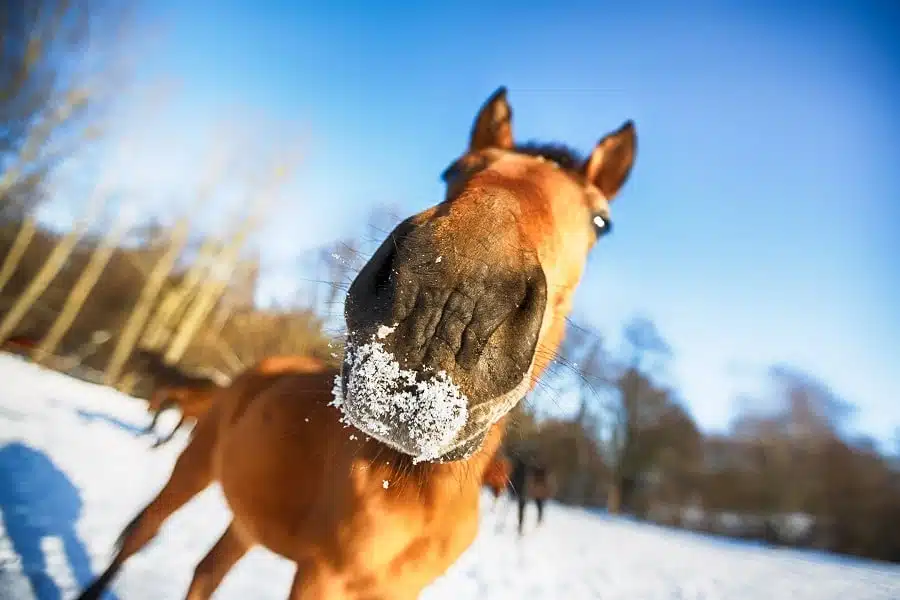
“Horse” by Edward Lear
There was an Old Man with a beard,
Who sat on a Horse when he reared;
But they said, “Never mind! you will fall off behind,
You propitious Old Man with a beard!”
There was an Old Man of Nepaul,
From his horse had a terrible fall;
But, though split quite in two, with some very strong glue
They mended that man of Nepaul.
“My Pony” by Unknown Author
My pony toss’d his sprightly head,
And would have smiled, if smile he could,
To thank me for the slice of bread
He thinks so delicate and good;
His eye is very bright and wild,
He looks as if he loved me so,
Although I only am a child
And he’s a real horse, you know.
How charming it would be to rear,
And have hind legs to balance on;
Of hay and oats within the year
To leisurely devour a ton;
To stoop my head and quench my drouth
With water in a lovely pail;
To wear a snaffle in my mouth,
Fling back my ears, and slash my tail!
To gallop madly round a field,—
Who tries to catch me is a goose,
And then with dignity to yield
My stately back for rider’s use;
To feel as only horses can,
When matters take their proper course,
And no one notices the man,
While loud applauses greet the horse!
He canters fast or ambles slow,
And either is a pretty game;
His duties are but pleasures—oh,
I wish that mine were just the same!
Lessons would be another thing
If I might turn from book and scroll,
And learn to gallop round a ring,
As he did when a little foal.
It must be charming to be shod,
And beautiful beyond my praise,
When tired of rolling on the sod,
To stand upon all-fours and graze!
Alas! my dreams are weak and wild,
I must not ape my betters so;
Alas! I only am a child,
And he’s a real horse, you know.
“Curiosity” by Mary Tourtel
All horses very curious are
And things which they espy afar
Arouse their curiosity:
They wonder what on earth they see.
With ears pricked up and cautious mien
They come to see. When they have seen,
They snort and turn and off they scurry
In a contemptuous desperate hurry.
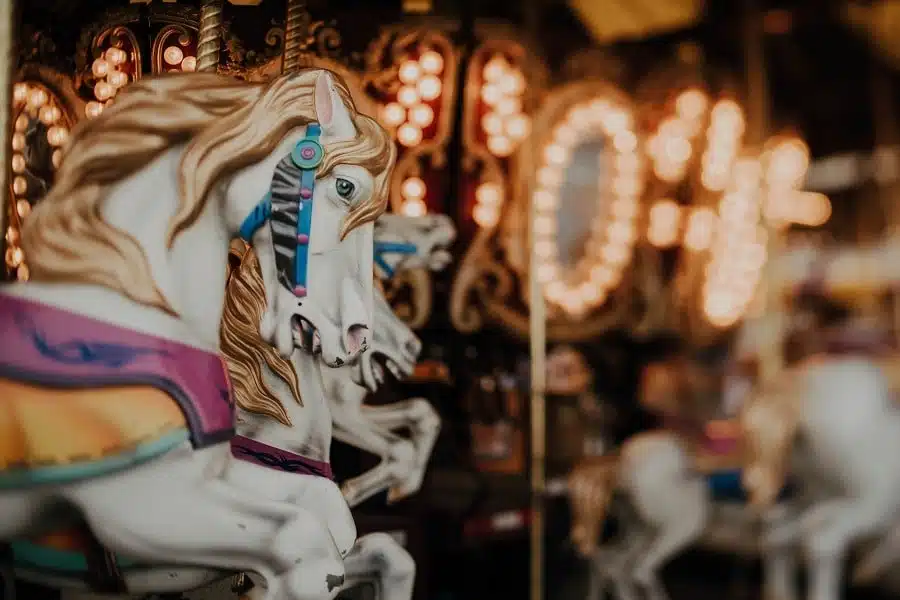
“The Horse (The Adventures Of Seumas Beg)” by James Stephens
A sparrow hopped about the street,
And he was not a bit afraid;
He flew between a horse’s feet,
And ate his supper undismayed:
I think myself the horse knew well
The bird came for the grains that fell.
For his eye was looking down,
And he danced the corn about
In his nose-bag, till the brown
Grains of corn were tumbled out;
And I fancy that he said,
“Eat it up, young Speckle-Head!”
The driver then came back again,
He climbed into the heavy dray;
And he tightened up the rein,
Cracked his whip and drove away.
But when the horse’s ribs were hit,
The sparrow did not care a bit.
“I Had a Little Hobby-Horse” by Unknown
I had a little hobby-horse, and it was well shod,
It carried me to the mill-door, trod, trod, trod;
When I got there I gave a great shout,
Down came the hobby-horse, and I cried out.
Fie upon the miller, he was a great beast,
He would not come to my house, I made a little feast,
I had but little, but I would give him some,
For playing of his bag-pipes and beating his drum.
“Ride a Cock-Horse” by Unknown
Ride a cock-horse to Banbury-cross,
To see an old lady upon a white horse,
Rings on her fingers, and bells on her toes,
And so she makes music wherever she goes.
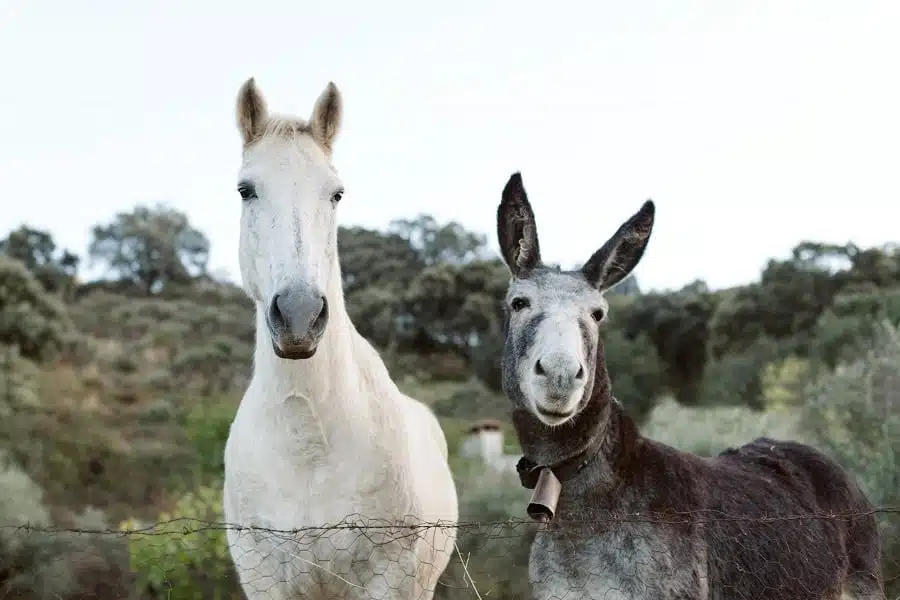
“The Horse And The Ass” by Jean de La Fontaine
In such a world, all men, of every grade,
Should each the other kindly aid;
For, if beneath misfortune’s goad
A neighbour falls, on you will fall his load.
There jogg’d in company an ass and horse;
Nought but his harness did the last endorse;
The other bore a load that crush’d him down,
And begg’d the horse a little help to give,
Or otherwise he could not reach the town.
‘This prayer,’ said he, ‘is civil, I believe;
One half this burden you would scarcely feel.’
The horse refused, flung up a scornful heel,
And saw his comrade die beneath the weight: –
And saw his wrong too late;
For on his own proud back
They put the ass’s pack,
And over that, beside,
They put the ass’s hide.
“Old Age” by Mary Tourtel
This horse’s working days are o’er.
The shafts and saddle nevermore
Shall hold him. Here he waits his end
Cared for by those who love to tend
An old companion. He may rest
In his loose box or take the best
Of grazing which the meadows give—
A pensioner while he shall live.
“If Wishes Were Horses” by Unknown
If wishes were horses,
Beggars would ride;
If turnips were watches,
I would wear one by my side.
